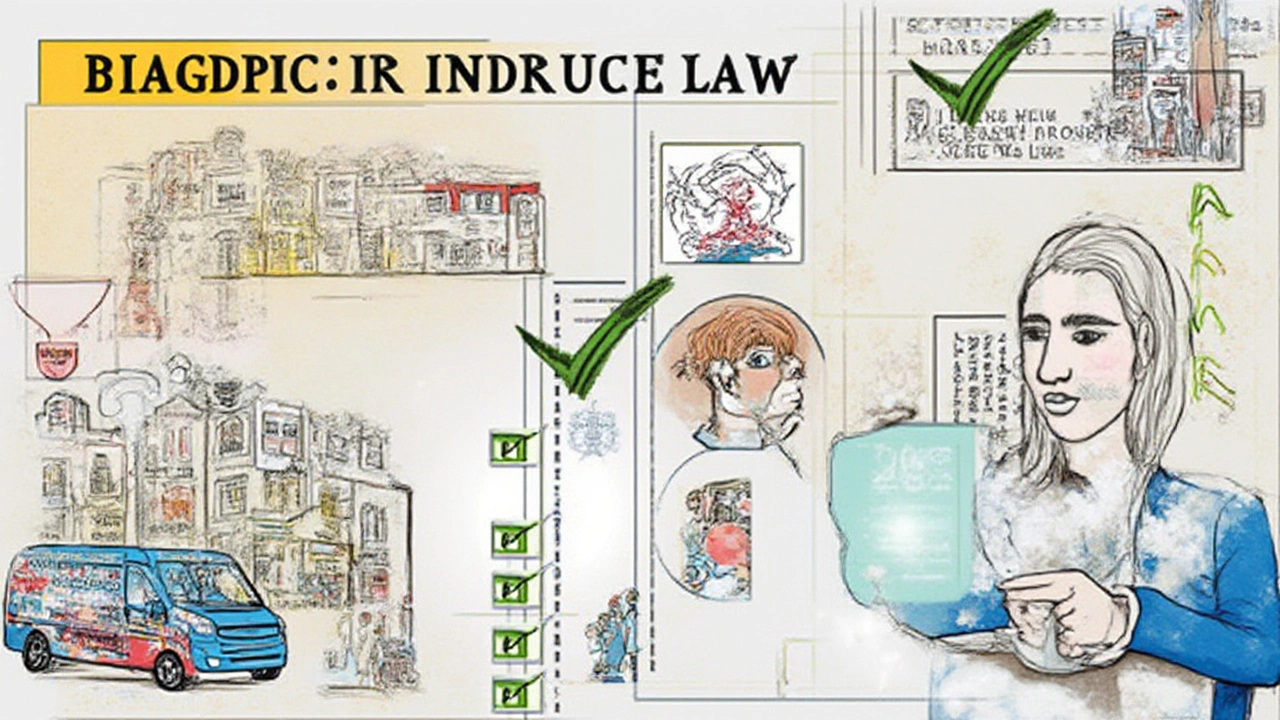Most of us bump into the word “commercial” every day. We see “commercial property” signs, watch “commercial breaks” during our favorite shows, and hear about “commercial agreements” in business news. But try asking two people what “commercial” actually means in a legal sense—prepare to watch confusion unfold. Turns out, this word has teeth when it comes to how we do business, sign contracts, and even buy property. It isn’t just about making money; it’s about the rules that separate business dealings from personal matters. So, what does commercial really mean under the law—and why should anyone care?
The Legal Meaning of Commercial: More Than Just Business
When lawyers use the word “commercial,” they’re not just talking about businesses making a profit. Legally, “commercial” refers to anything connected to trade, business, or the exchange of goods and services for value. This could be a supermarket operating in a city center, a haulage firm leasing trucks, or a digital agency creating ad campaigns for clients. The law treats these activities differently compared to personal or domestic matters. That’s the key difference—commercial means the primary focus is trading, selling, and providing services, not personal use or private enjoyment.
Let’s put it in perspective. In the UK, there’s a mountain of commercial law dating back hundreds of years, all aimed at keeping business fair but competitive. Some of the most important roots were planted during the Industrial Revolution, when the economy began to depend on reliable trade and consistent standards. Today, “commercial” crops up in statutes like the Sale of Goods Act 1979, which covers contracts for the sale and purchase of items in the course of business. Here, “commercial” transactions are protected and regulated in ways that don’t touch personal shopping for leisure or gifts—for example, strict warranties and return rights can differ wildly between commercial and consumer contracts.
Here’s where things get interesting: commercial contracts (like those for office cleaning or transport services) have stricter requirements for clarity, negotiation, and documentation. The courts expect businesspeople to read the small print, negotiate clauses, and stick to deadlines since both sides should be “in the know.” Try telling a judge you didn’t understand a clause in a commercial agreement—they’ll be less forgiving than with an everyday consumer deal. This arms-length approach gives businesses room to iron out deals as they like, but it means higher stakes for mistakes or loose ends.
Commercial law also shapes what counts as business property. Legally, a “commercial” property is one used for trade, industry, or services, not for living. Think high streets lined with shops, office buildings, or even the local gym. Tax rules, safety standards, and planning permissions all shift under this label. For example, commercial properties in England often pay different Business Rates (a type of property tax), and using your home for commercial purposes (like running a shop from your kitchen) can land you in trouble with planning authorities if you haven’t cleared it with the council.
Don’t forget intellectual property, either. If you create a piece of software or design a new logo, using it for commercial (for-profit) purposes comes with a wave of legal responsibilities and options that don’t apply when you’re just playing around at home. Want to sell that software or license it to another company? You’ve stepped firmly into the commercial arena, with all the laws and protections it brings—copyright, contracts, and competition rules all kick in at this point.
If you’re thinking commercial always means “big business,” think again. Even a small sole trader running a flower stall falls under this umbrella the moment they offer goods or services for money. The law never judges your size—it’s the intent and context of your activity that matters.
A quick tip: if you’re involved in any sort of trade and wondering if it’s commercial, ask yourself—am I doing this to make money or as part of an ongoing business? If the answer is yes, the world of commercial law just opened its door.

Types of Commercial Activity and Where the Law Steps In
Let’s break down where “commercial” shows its face. First up: property. Commercial properties have their own planning rules, fire safety regulations, and tax requirements. Renting office space? You’ll get a commercial lease, usually with longer terms, stiffer break clauses, and clauses about repairs and subletting that you won’t see in a residential agreement. In the UK, laws like the Landlord and Tenant Act 1954 exist purely to manage commercial property rights. Fancy running a B&B? The moment that ‘for profit’ sign goes up, you’re in the commercial world with stricter standards for hygiene, fire exits, and accessibility.
Then we have commercial contracts—these set the tone for nearly every business tie-up. Agreements for supplying goods, providing services, or partnering up are governed by commercial contract law. If there’s a disagreement, courts look at things very differently compared to personal issues. For example, they expect both parties to have negotiated and understood the terms. A simple handshake often won’t cut it. You’ll see detailed terms about payment, delivering goods, sorting out late work, what happens if someone drops the ball, and more. You won’t find many “cooling off” periods in B2B deals either, so once you sign, you’re in.
Employment law also splits between commercial and non-commercial relationships. Employees of businesses have different protections and obligations than, say, someone helping out as a favour. The rules around minimum wage, working hours, and health and safety get much tighter the minute an arrangement turns commercial. Even if you’re paying your mate to mow the lawn, once it’s part of their business, employment law might nudge in.
On the money side, commercial banking is a whole different game to your personal account. Commercial bank accounts require more paperwork, face stricter monitoring, and have unique fees and facilities (like business overdrafts or merchant card services). Even insurance for a commercial venture is tougher. You’ll need policies built for business risk, not off-the-shelf options.
Advertising is another big one. Commercial advertising—think marketing your product or service—faces tough rules under UK law. The Advertising Standards Authority will step in if claims are misleading, obscene, or target kids in the wrong way. Your personal social posts aren’t policed the same way as an advert from a business account.
Let’s not forget digital business. E-commerce, online subscriptions, and digital services all fall under commercial law. The UK’s Electronic Commerce Regulations 2002 push online businesses to provide clear information about pricing, returns, and seller identity. If you sell artwork on Etsy as a hobby, the law’s grip is loose; do it as a registered business, and the commercial net tightens fast.
Here are a few practical tips for anyone dealing in commercial matters:
- Always get written contracts. Even if it feels formal, it’ll save pain if things go south.
- Keen on renting out office space? Check if you need Business Rates registration—and make sure your lease covers what you think it does about repairs, service charges, and break clauses.
- Separate your personal and business banking. That way, tax time won’t be a nightmare (and HMRC won’t start asking awkward questions).
- Keep records of all commercial communications—emails and texts can count as part of a contract.
- When advertising, double-check claims and get familiar with the Advertising Standards Authority code to avoid nasty letters or fines.
The golden rule? Whenever money changes hands in a structured way, commercial law probably has something to say about it. Don’t assume a “friendly deal” sits outside the rules the moment sales or contracts are regular.

Why the Legal Meaning of Commercial Matters in Daily Life
So, why stress over the legal definition of “commercial”? It’s easy to think this only matters to big companies or city lawyers, but the reality is it shapes almost every paid exchange in modern life. Take buying a sandwich at a shop—commercial law sits quietly in the background, making sure the food is safe, transactions are fair, and the premises licensed. Let’s go bigger. Say you want to launch your own gym in Bristol or rent out a gallery for pop-up events. Whether the property is labelled residential or commercial decides everything—from the insurance you need to the fire alarms you install.
For startups and freelancers, knowing where “commercial” starts and stops is crucial. If you offer graphic design services, the legal approach to your client contracts changes when you cross from hobbyist to registered business. Suddenly, your contract terms, how you handle data, and your liability for lost files aren’t just friendly agreements—they’re binding commercial contracts. In 2022, the UK's Small Business Commissioner reported that nearly £23 billion in late payments were owed to small firms. Why so much chaos? Many neglected the power of clear commercial contracts and fell foul of payment terms they didn’t clarify at the start.
Then there are commercial landlords and tenants, especially in a place like Bristol where commercial spaces are at a premium. Commercial leases are full of pitfalls for the unwary: rent review dates, break conditions, service charges, and hidden repair obligations that can surprise even experienced renters. That’s why tip number one from property lawyers is: read every word of your lease, and bring in a surveyor before you sign.
If you’re investing or lending money, the law treats commercial deals as higher risk compared to personal loans. Protections are fewer, and courts expect buyers and lenders to do their homework. Commercial lending agreements will spell out default interest rates and security requirements that never appear in personal lending contracts between friends or family.
Even planning a business event—say, a street food fair—falls under “commercial” in the eyes of local councils. You’ll need to register with Environmental Health, meet extra health and safety rules, and have insurance in place. Miss one piece and you may find your event pulled, or worse, your new business slapped with a fine.
If you deal in property, services, or goods in the UK, the word “commercial” is everywhere. It decides which tax breaks you get, what protections or red tape applies, and how disputes will shake out if the worst happens. The law views commercial players as knowing the game, so the margin for error shrinks—one reason why most successful business owners have a lawyer and accountant they trust on speed dial.
In short, whether you’re thinking about a side hustle, planning to buy a shop, negotiating supplier contracts, or scaling up to employ staff, understanding when an activity turns “commercial”—and embracing the rules that follow—can mean the difference between thriving and discovering all-too-late that you broke the rules without even realising. If you’re ever in doubt, it’s worth getting a quick professional opinion before you commit. The legal meaning of commercial isn’t just lawyer-speak—it’s the backbone of business life.





